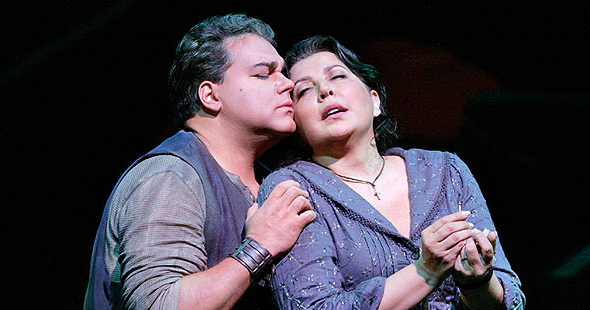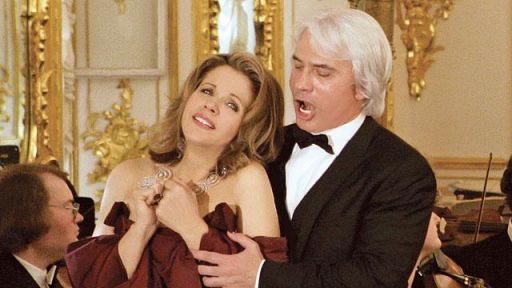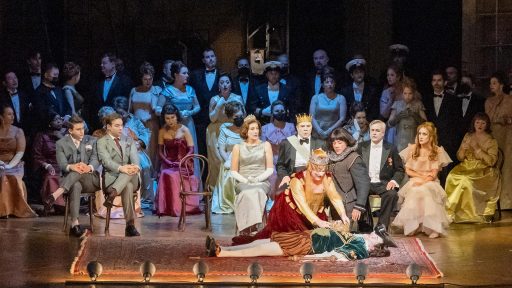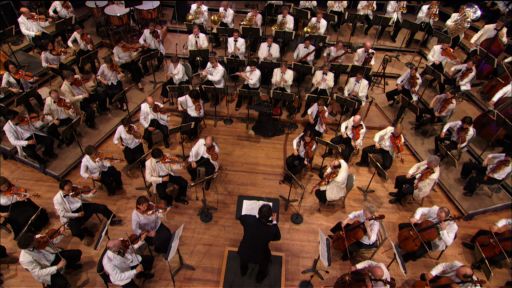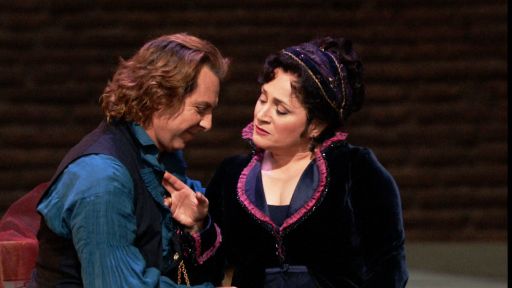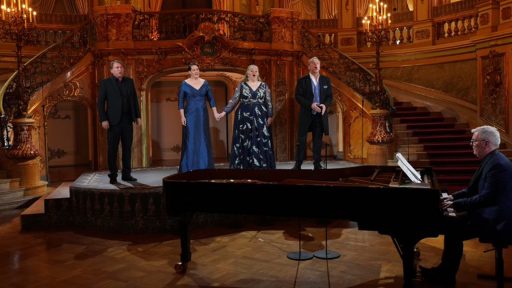Composer: Giacomo Puccini
Librettist: Giuseppe Adami, adapted from the play “La Houppelande” by Didier Gold
Production: Jack O’Brien
Conductor: James Levine
Performers:
“Il Tabarro”: Maria Guleghina (Giorgetta), Salvatore Licitra (Luigi), Juan Pons (Michele), Stephanie Blythe (Frugola), David Cangelosi (Tinca), Paul Plishka (Talpa), John Nuzzo (Song Seller), and Anne-Carolyn Bird and Tony Stevenson (Young Lovers)
“Suor Angelica”: Barbara Frittoli (Suor Angelica), Heidi Grant Murphy (Sister Genovieffa), Stephanie Blythe (La Principessa), Wendy White (The Monitor), Barbara Dever (Mistress of Novices), Maria Zifchak (Nursing Sister), Patricia Risley (The Abbess), Jennifer Black (First Alms Collector), Jane Gilbert (Second Alms Collector), Lisette Oropesa (First Lay Sister), Edyta Kulczak (Second Lay Sister), Anne-Carolyn Bird (First Novice), Leah Wool (Second Novice), and Jennifer Check (Sister Dolcina)
“Gianni Schicchi”: Olga Mykytenko (Lauretta), Massimo Giordano (Rinuccio), Alessandro Corbelli (Gianni Schicchi), Jennifer Check (Nella), Patricia Risley (Ciesca), Stephanie Blythe (Zita), Bernard Fitch (Gherardo), Jeff Mattsey (Marco), Donato Di Stefano (Simone), Patrick Carfizzi (Betto di Signa), Paul Plishka (Spinelloccio), Dale Travis (Amantio di Nicolao), Peter Volpe (Pinellino), Keith Miller (Guccio), and Jacob Wade (Gherardino)
Synopsis:
Act I: “Il Tabarro”
Michele’s barge on the Seine in Paris
Giorgetta is busy with her chores, while her husband, Michele, stands on deck. He asks her to kiss him, which she does, but without affection. She offers wine to Luigi, one of the stevedores, and they are joined by two other deckhands, Tinca and Talpa. They begin a dance, only to be interrupted by Michele. With a song seller peddling his songs in the background (“Primavera, primavera”), Giorgetta asks Michele why he seems so troubled, but he does not answer. Talpa’s wife, Frugola, arrives to take him home and displays the wares she has collected on her daily rounds (“Se tu sapessi”). Tinca plans to drown his troubles in drink; Luigi agrees that it is the only way to cope with their bleak existence (“Hai ben ragione”). Frugola dreams of a little house in the country (“Ho sognato una casetta”) and Giorgetta wishes she could leave the barge (“E ben altro mio sogno!”). She and Luigi consider the beauty of the city and its quiet suburbs. After Frugola and Talpa leave, Giorgetta and Luigi express their love for each other (“O Luigi! Luigi!”). Suddenly, Michele appears from the cabin, and Luigi, finding it unbearable to share his beloved Giorgetta with another, asks to be put off the barge when they reach Rouen. Michele convinces him not to leave his job, assuring him there’s no work in Rouen, and returns to the hold. Giorgetta and Luigi arrange to meet later that evening. She will leave the gangplank in place and light a match when Michele has gone to sleep. Luigi goes off and Michele again comes on deck. Sensing Giorgetta’s restlessness, he tries to evoke her past love for him by recalling happier days before the death of their child. Failing to regain her affection, Michele expresses his suspicions that Giorgetta is in love with another man, but he cannot figure out who it is (“Nulla! Silenzio!”). He settles down on the deck and lights his pipe. Seeing the light, Luigi rushes on board, thinking it is Giorgetta’s signal. Michele grabs him, forces him to admit his love for Giorgetta, and strangles him, then conceals the body in his cloak. Giorgetta reappears on deck to apologize to Michele, who throws open his cloak to reveal Luigi’s dead body.
Act II: “Suor Angelica”
A convent
Sister Angelica and two lay sisters are late for chapel. The Monitor chides them for not doing penance as Sister Angelica has done. Some of the sisters confess they still long for worldly pleasures — Sister Genovieffa for the lambs she used to tend and Sister Dolcina for sweet things to eat. Sister Angelica denies she has any such desires, but the others know she desperately longs for some word from her family. For seven years she has heard nothing from them, and the sisters speculate that she was a princess, banished to the convent for reasons they have been unable to discover. Soon alms collectors arrive, distributing the food they have gathered. One of them mentions that a magnificent coach bearing a visitor stands outside the convent gate. Angelica is startled and, with increasing anxiety, asks her to describe the coach in detail. A bell rings, announcing the visitor. The Abbess enters and tells Angelica that her aunt, the Princess, has come to see her. Approaching, the Princess rejects Angelica’s gestures of affection. The Princess explains that when Angelica’s parents died, she was made guardian of both Angelica and her sister, Anna Viola, and was given control over their inheritance (“Il principe Gualtiero”). Anna Viola is to be married, and the Princess demands Angelica sign her share over to her sister. Having brought disgrace on the family name, the Princess declares, Angelica is no longer entitled to any part of the inheritance. Crushed by her aunt’s cruelty, Angelica swears she has repented. She cannot, however, erase the memory of her little son, who, she learns, died two years ago. Her will now broken, Angelica sobs and signs the document. The Princess withdraws and Angelica grieves that her son died without his mother by his side (“Senza mamma”). Resolving to join her child in heaven, she drinks poison. She is then struck by the reality of what she has done and prays for salvation. A celestial choir is heard and Angelica sees a vision of the Blessed Virgin with her child.
Act III: “Gianni Schicchi”
The Palazzo of Buoso Donati in Florence
The greedy relatives of the wealthy Buoso Donati gather at his deathbed to mourn his passing and investigate the details of his will. There are rumors that the old man has left nearly everything to a monastery. If his will has not been filed with a notary, however, there is still hope for the relatives, who begin a frantic search for the document. Young Rinuccio finds it and makes his Aunt Zita promise to let him marry his beloved Lauretta if there is enough money. They read the will, which proves the rumors were true; the relatives finally shed genuine tears. Rinuccio suggests that Lauretta’s father, Gianni Schicchi, a shrewd self-made man, can help them: this new breed of peasant-turned-businessman will invigorate Florence, which the young man compares to a tree in full flower (“Firenze è come un albero fiorito”). Schicchi appears with Lauretta. Disgusted by the hypocrisy and avarice of the aristocratic family, he is about to leave, but decides to stay when Lauretta proclaims her intention to marry Rinuccio (“O mio babbino caro”). Reading the will, Schicchi devises a plan to impersonate the dead man. He sends Lauretta home and orders the body removed from the bed. The doctor arrives to check on Buoso, but Schicchi’s voice convinces the addled doctor that the patient is improving. Schicchi tells the relatives to send for the notary and, putting on Buoso’s nightshirt and cap, promises to dictate a new will. The relatives each try to get a promise from Schicchi that he will leave the best parts of the estate to them. Schicchi agrees with every secret request and warns each that they must keep the secret forever or face the punishment as accessories to a fraud — a hand cut off and eternal banishment from Florence. The notary arrives with witnesses, and Schicchi dictates that the great part of the estate, including the house they are all in, is to be left to his good friend Gianni Schicchi! The relatives are furious but can say nothing, and when the notary leaves they fall on Schicchi and steal what they can from the house. Schicchi orders them out of his house and points to the young lovers, standing out on the terrace gazing at the blossoming city. Turning to the audience, he points out how happy his fraud has made the lovers, and pleads for a verdict of not guilty.
Opera synopsis courtesy of the Metropolitan Opera.
Funding for GREAT PERFORMANCES AT THE MET: “Il Trittico” has been provided by Toll Brothers, the National Endowment for the Arts, the Corporation for Public Broadcasting, the Charles E. Culpeper Foundation, Donald G. Sisler, and the Arthur F. and Alice E. Adams Charitable Foundation, Miami, FL, and PBS.
Related Web Sites
- Maria Guleghina
- Salvatore Licitra
- Juan Pons
- The Metropolitan Opera: Interview: Stephanie Blythe
- David Cangelosi
- Barbara Frittoli
- Kirshbaum Demler & Associates: Heidi Grant Murphy
- Wendy White
- Alste & Mödersheim: Olga Mykytenko
- Massimo Giordano
- The Metropolitan Opera: Alessandro Corbelli
- Land of Puccini
- The Metropolitan Opera: Interview: Jack O’Brien
- SONY BMG Masterworks: Artists: James Levine

